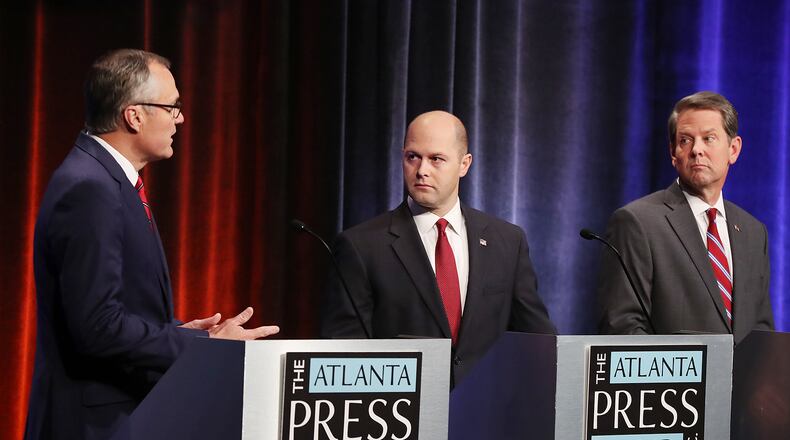UPDATED Tuesday with comment from Gov. Brian Kemp:
To fill a vacancy on the State Charter Schools Commission, Gov. Brian Kemp has nominated former state senator Hunter Hill, who had a secondary role in the downfall of chief Kemp rival Lt. Gov. Casey Cagle during the 2018 Republican contest for governor.
Hill was also a candidate for governor. In a letter to the state Board of Education dated June 3, Kemp nominates Hill, who works for a wealth management firm, or Lisa Durden, who is director of appointments and business regulation in his office, for an open seat on the Charter Schools Commission. (The law requires the governor offer at least two nominees for each appointment.)
In a statement, Kemp said, “Hunter has long been a leader in advocating for parents and students to have better educational outcomes. His work in the state Senate paved the way for greater innovation and choice in the classroom and I look forward to the work Hunter will do on the Charter School Commission to put Georgia students first.”
Approved in 2012 through statewide referendum, the Charter Schools Commission has the power to approve charter schools, even over the objections of local districts. A similar commission had been in place since 2008 but the state Supreme Court declared it illegal in 2011. That led to a Republican-crafted amendment to the Georgia constitution re-creating a state-appointed commission to approve and fund charter schools.
Cagle wanted to ward off a donation to Hill by the pro school choice Walton Family Foundation by enhancing his own reputation as a choice ally. As the AJC reported, Cagle met with then Senate Education and Youth Committee Chair Lindsey Tippins, R-Marietta, about House Bill 787, which would raise charter school funding for the 20 charter schools approved by the Charter Schools Commission.
Tippins opposed the bill, explaining to the AJC that under the current state formula, funding for those state-authorized, brick-and-mortar charter schools stands at $8,415 per pupil, which was more than the combined state and local spending per student in 46 of 180 Georgia public school districts. Including Gwinnett,
HB 787 would increase the per-pupil spending to $8,816, which was more than the combined state and local spending per student in 96 Georgia school districts.
Tippins did not think that was fair, pointing out that to spend the equivalent on all other public schools in Georgia would run to more than $500 million a year.
The AJC reported:
"Well, I've got to have the bill," Tippins quoted the lieutenant governor as saying. Tippins described what came next: "He said, 'Look, this is the deal.' He said, 'I've got to do something for charter schools.' He said, 'The Walton Family Foundation is fixing to put $2 million in Hunter Hill's campaign. And he said, 'If this bill passes, I'll get it in mine.' He didn't go into any details, but that was my understanding."
A secret recording by Tippins' nephew captured Cagle admitting the bill was bad public policy. The recording was made by Clay Tippins, who came in fourth place in the Republican primary for governor.
As the AJC reported:
Cagle told Clay Tippins in the recording that he circumvented the state Senate's top education leader and swallowed his own misgivings over the bill, which raised the cap on tax credits for private school scholarships to $100 million, purely to prevent Hunter Hill from receiving financial help from a super PAC.
"They wanted that $100 million SSO," Cagle told Tippins in the recording, referring to the abbreviation for the tax credit program, Student Scholarship Organizations. "And, you know, I was the only guy standing in the way. Is it bad public policy? Between you and me, it is. I can tell you how it is a thousand different ways."
About the Author
Keep Reading
The Latest
Featured


